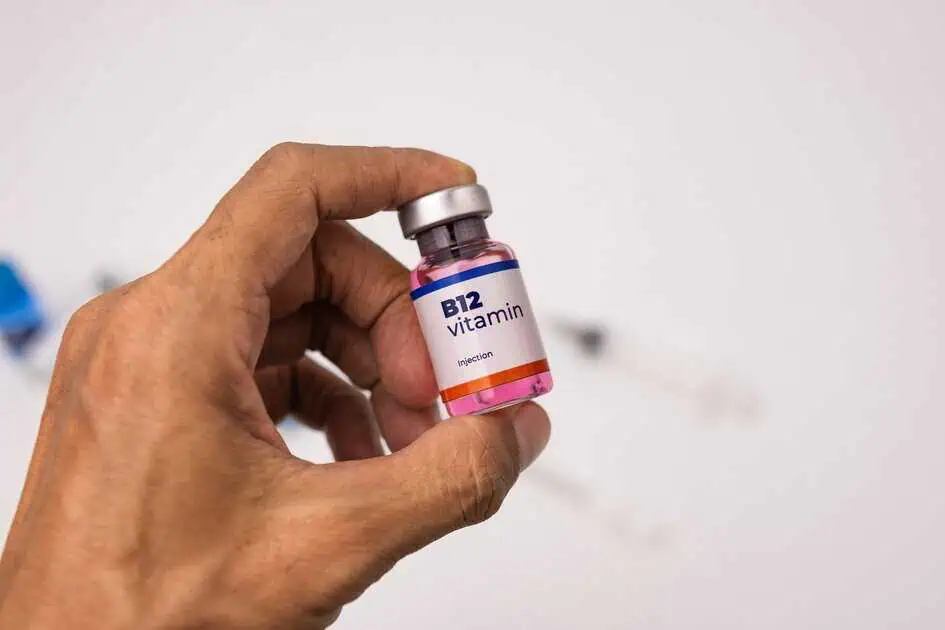Due to the widespread vitamin B12 deficiency, many often believe it will act as a safety net and help ensure sufficient nutrients. In fact, vitamin B12 is a water-soluble vitamin, also known as cobalamin, which plays an essential role in brain function and the production of red blood cells and DNA. B12 injections are prescribed by doctors and given intramuscularly or into the muscle to help aid brain function, energy levels, and weight loss, to name a few.
What Are the Symptoms of Low B12?
Symptoms of vitamin B12 deficiency include:
- a pale-yellow tinge to the skin
- a sore and red tongue (glossitis)
- mouth ulcers
- pins and needles (paraesthesia)
- changes in the way a person walks and move around
- disturbed vision
- irritability
- depression
What Are the Deficiency Risk Factors of Vitamin B12?
The chance of developing vitamin B12 deficiency can increase due to the following risk factors:
- older age
- high alcohol consumption
- pernicious anemia
- atrophic gastritis (inflammation in the stomach)
- Helicobacter pylori infection
- celiac disease
- Crohn’s disease
- gastrointestinal surgery history
- following a plant-based diet
- pancreatic insufficiency
- AIDS
- some hereditary conditions that affect the vitamin B12 absorption
Who Should Have Vitamin B12 Injections?
It is crucial to note that Vitamin B12 injections are available by prescription only following a clinical diagnosis of low B12 levels. On the other hand, low levels of B12 are uncommon in most healthy adults because the human liver stores vitamin B12 over time. Below are the conditions requiring B12 injections.
Vitamin B12 Deficient
Following a doctor’s diagnosis, anyone with symptoms and signs of a vitamin B12 deficiency or pernicious anemia can benefit from B12 shots. Additional symptoms are included below aside from the ones mentioned above:
- a sore tongue
- constipation
- difficulty thinking and remembering
- dementia
- fatigue
- heart palpitations
- infertility
- low appetite
- mood changes
- numbness and tingling sensation in the hands and feet
- pale skin
- weight loss
Gastrointestinal Issues
Other conditions that may affect vitamin B12 release or absorption are related to the gastrointestinal tract, including the following:
- celiac disease
- Crohn’s disease
- fish tapeworm infestation
- bowel or pancreatic cancer
- folic acid deficiency
- overgrowth of bacteria in the small intestine
- pernicious anemia (can lead to gastric atrophy or stomach damage)
Moreover, those who have undergone gastrointestinal surgery, including weight loss surgery, may have fewer cells necessary to secrete stomach acid and intrinsic factors. This can also affect vitamin B12 absorption.
Age-Related Problem
2105 research suggests that vitamin B12 deficiency is more likely to affect those over 60 years. That said, some elderly may benefit from vitamin B12 injections.
In fact, older adults have a higher risk of conditions in connection to reduced stomach acid production, including gastric atrophy, as found by scientists. In addition, certain bacteria grow due to low stomach acid, which can use up the stored vitamin B12.
Vegans and Vegetarians
Mainly, vitamin B12 occurs in animal foods, making people following a plant-based diet have a higher risk of vitamin B12 deficiency. 2010 research looked at data from 689 men, which found higher rates of vitamin B12 deficiency in those who followed a plant-based diet. Low vitamin B12 levels are found in over half of those vegan and 7% vegetarian, compared with under 1% of people who consumed meat.
What Are the Potential Health Benefits of B12 Injections?
Vitamin B12 deficiency can have serious health consequences since this nutrient plays a vital role in the body. As indicated, low blood levels of the vitamin have been linked to several health problems. That said, here are the benefits of B12 injections.
Brain Function
A decline in brain function has been linked to low vitamin B12. In fact, low blood levels and the development of dementia have been linked together. It is important to note that results have been mixed, and vitamin B12 treatment was ineffective at improving brain function for those with normal brain function.
Depression
Aside from brain function decline, low vitamin B12 levels and depression are also linked. Although one review found the treatment ineffective in reducing the severity of symptoms, it was suggested that taking the vitamin long-term could help prevent a relapse into depression.
Osteoporosis
Since osteoporosis results in weaker bones due to loss of bone mass, as well as an increased risk of bone fractures, vitamin B12 is beneficial in increasing bone mass. That said, taking vitamin B12 may reduce the risk of osteoporosis. However, studies have provided mixed results.
Age-Related Macular Degeneration
This is a condition that causes one to lose central vision, usually in both eyes, gradually. In fact, there should be an adequate consumption of vitamin B12 in people aged 50 and over since it is thought to be important for protecting against macular degeneration and maintaining good vision.
In one large study, 5,200 women received 1,000 mcg of vitamin B12 daily and other B vitamins and folic acid seven years later. The study found a 35% lower risk of age-related macular degeneration among women who took the supplements. Although the risk reduction can’t be attributed to vitamin B12 only, it does suggest that getting enough may be important.
What Is Vitamin B12 Side Effects?
Get emergency medical help for any signs of an allergic reaction to Vitamin B12, like hives, difficulty breathing, or swelling of the face, tongue, lips, or throat. Also, it’s best to call a doctor in case of the following:
- Heart problems. This involves swelling, rapid weight gain, and feeling short of breath.
- Fluid build-up in or around the lungs. The pain is associated with breathing, feeling short while gasping for breath, lying down, wheezing, coughing with foamy mucus, cold and clammy skin, anxiety, and rapid heartbeat.
- Low potassium level. This includes leg cramps, constipation, irregular heartbeats, fluttering in the chest, increased thirst or urination, numbness or tingling, muscle weakness, or limp feeling.
Common Vitamin B12 side effects may include:
- diarrhea; or
- swelling anywhere in the body.
Final Thoughts
Vitamin B12 is an energy-boosting vitamin and is also known to provide great strength to the immune system, which helps the system to fight off germs and infections. My Face Lady Concierge Medspa offers B12 Injections for those having trouble obtaining enough vitamin B12 in their diet. Ultimately, Vitamin B12 injections provide many benefits, such as enhancing memory, mood, energy, and immune function while also slowing aging.








